In 2006, I started a band called The Cast Before the Break. We released a couple records before being picked up by Deep Elm Records, and in the process of recording our third, things fell apart. Call it creative differences, call it personal differences, it was a devastating end to a project near and dear to our hearts. Right place, wrong time.
Since 2013, this half-finished record has been sitting on various hard drives. I have gone through three computers since we began tracking. Most of us have gone through an average of five different houses/apartments. During the pandemic, it suddenly felt right to boot up the hard drive and take a look at what we started all those years ago.
Fast forward to today – that record, titled Where We Are Now, just as we’d planned for the last decade, is released into the world thanks to Mint 400 Records. Rather than put together an impersonal track-by-track article, I thought it would be fun to get the gang back together for a Zoom happy-hour and talk through the record, song by song, amongst ourselves. Almost like interviewing my own friends. I can count on one hand the amount of times I have seen most of these guys in the last ten years. But it didn’t take long at all for things to feel almost normal again.
Below is an edited-for-length transcript of our chat, where we uncovered not only what it means to finally deliver this mythical record to our fans, but also the closure it’s given each one of us.
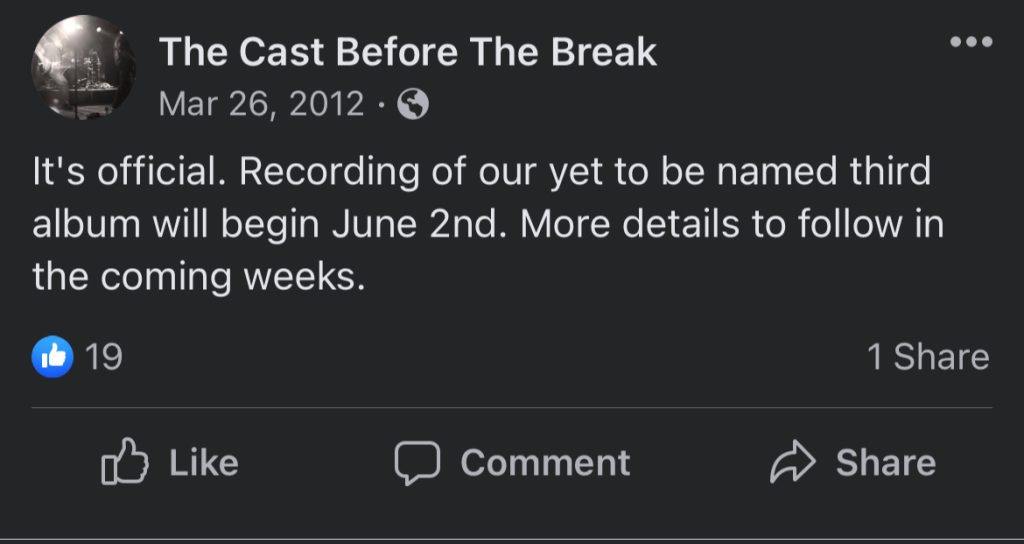
FRIENDS OF MINE
TJ Foster (vocals/guitars): I think we’ve all heard this song as the closer until recently. Jordan, you suggested opening the record with it, which was strange after ten years of thinking the opposite. What led you to that?
Jordan Stewart (guitar): Uhh. Just throwing shit against the wall. Haha. ‘Friends of Mine’ just felt the most like a segue from the last album. It felt like a natural transition from ‘A Breath of Fresh Air’ as the next track in the discography.
Ryan Crosby (drums): I agree. It’s also a little callback to the beginning of Still. It starts things off on a good foot as a welcome back. And I’ve said this to TJ before, but when Lauren [Foster] kicks in with her vocal, it’s fucking beautiful. That part gives me chills every single time. It’s probably one of my top three moments on the record.
Lars Ewell (bass): ‘Friends of Mine’ gives me vibes and callbacks to As Your Shoulders… It’s a cool combination of our two albums – it feels like a natural progression. I really like that.
Jeremy, I know you sent this around to a few people ahead of time, and one thing you heard was that this song is the most Cast Before the Break song we’ve ever put out.
Jeremy Carter (guitar): Haha. “Track one is so indulgent… but that’s not a bad thing.” To that point, it’s very us. But with a newer spin. This whole record starts off like, “hey, we made it, we’re fine…” It just feels like we’re more content, and I think that contributes to it seeming less “angsty,” as Lars would say. Even though yes, these were written like ten years ago…
JS: That’s what’s so weird about it. I know it’s developed over ten years – TJ’s songwriting is from ten years ago – but the album feels like it’s us now. Like we’re more at peace with life.
WHERE WE ARE NOW
Most of the songs’ lyrics were written many years ago. I didn’t change too many lines in the end. At the time, the idea of this song was encapsulating the experience of starting a band when we were still in college, versus where we were at the time of recording. And now it’s ten years later so it’s even gone through a third iteration. Jeremy, you’ve mentioned this song’s lyrics specifically a few times – what does it mean to you?
JC: Maybe this is a little direct but, to me, it is a very good representation of coming to terms with the past. I feel like watching old videos, listening to old songs or whatever, sometimes I get stuck in my head, wishing it came out better or went differently. But if you’re always stuck in that mode and worrying about what you could or should have done, you’re never taking the next steps to make it better. This song became an idea that I really latched onto.
RC: For me, coming back to this record… listen, honestly, there were some demons exercised for myself going through this process. We started this ten years ago. Things didn’t end well – I think that’s fair to say, right? To hear these songs again… shit, these are relationships that meant a lot to me for a long time, at a pretty intense moment in our lives. This record opened up lines of communication that I hadn’t had for a while. We have gotten older, we have started families – as those things happen, it’s easy to forget about the things that led you to where you are.
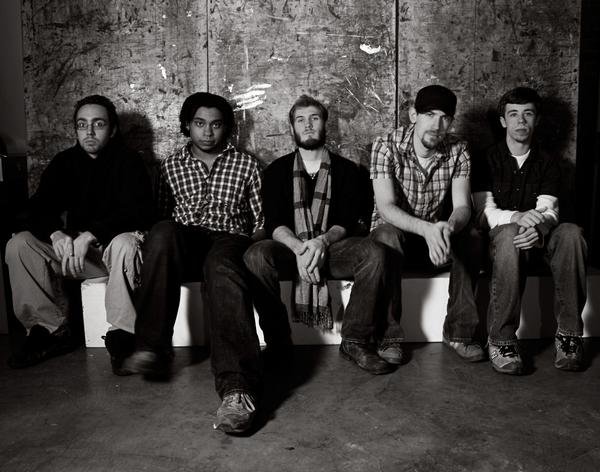
This song didn’t exist until we got to the lake house that day. I remember specifically wanting to try something like this in the studio, writing a song off the cuff. Some of it has obviously developed over the years, but some parts – like that quiet bridge – are almost exactly as sketched out on day one.
RC: There’s so many songs that take forever to get right, and when you get those ones that come together in a short amount of time, they just have a little extra meaning, at least for me. That feeling of the day that we arrived, set everything up, started fucking around and this song came out of it…
JC: It was a whole different headspace. Part of why I struggled [writing] ten years ago was that I couldn’t see the end product of these songs. I think TJ always knew, which is why he was able to write and finish them. But when I started writing my parts, I was stuck. It took all these years to sit down and realize I didn’t need to have a preconceived notion – just play and see what happens. It was a really different mindset [from our other records].
SHIPS PASSING
Most of our older stuff was a lot freer flowing. With Where We Are Now, I think we were trying to meld the post-rock stuff we did into more “pop-oriented” songwriting. I always thought that was a cool thing to try and navigate. ‘Ships Passing’ is a perfect example – it’s very different from anything we’ve ever done. And one of the things that holds it together is the bass groove.
LE: I honestly do not remember writing those parts. Haha. I do remember very distinctly the feeling of recording in your apartment, TJ. That feeling was very laidback, natural and stress-free. I feel that foundation in those grooves – and throughout all the songs, really.
I think the biggest contributing factor there was time – we weren’t stressing about reaching a deadline or whatever. Jordan, you and I have always felt this was a natural first single even though it was super different for us. What’s always given you that feeling?
JS: It was always that chorus. I feel like it’s one of the catchiest things we’ve had in a Cast Before the Break song. From the beginning, it just seemed like one of those things that would stick with people. Sometimes the best songs mean something really deep, but the words aren’t necessarily the most complicated thing in the world. Over the years, this one has evolved for me personally with what I connect to. I don’t know if this is where your head was at originally when you were writing it, but for me, I feel like it’s about my kids when I hear it now.
I like that about music in general – your favorite songs, you take them through life and they tend to mean different things along the way. I’ve never really had a song that I’ve written do that because I’ve never had time to take one through different eras of my life.
JC: Can I pivot for a second and ask you a question, TJ?
Sure.
JC: There are prior songs that I am sure you wrote about specific things. One example that comes to mind is ‘Onward Love’. A long time ago, I asked you what one of the lines meant and you said, “I don’t know, it sounded cool”. I didn’t fully get what some of the songs were about. But this record, there are definitely moments where I just know what you’re talking about. Which I think makes it a lot more accessible. Was it a conscious decision to pivot a bit from what you were doing in the past?
Recently, I consciously started to do that more but I’m realizing I actually started doing this even back then. Where the words were a lot less shrouded in metaphor and more… direct? Not even direct, but I’d write a line down and not go back and change it just for the sake of obscuring it more. You’re right, I think about As Your Shoulders… for example. That was a ‘concept record’ but it wasn’t like we sat there and said, “let’s fucking make a concept record!” It was more like we wrote six songs with similar themes and then made them fit that concept. What does ‘Onward Love’ mean? I don’t know, man. I was listening to a lot of The Receiving End of Sirens at the time; they use a lot of big words and they really like Shakespeare. So yeah, a lot of those songs, I connect to from a musical standpoint and from what they represented in my life playing them with you guys, but to your point, this record has more of a lyrical connection.
JC: I think others will get that too and have an easier time getting into the songs because there’s real thought and emotion to connect to.
LIGHTHOUSE
What I love about this one is that, save for very few minor overdubs, this is the one song on the record where everything on it was truly recorded in 2012 and 2013.
LE: I feel like this was one of the first songs that was written for the record, right?
RC: This one, ‘Hindsight’ and ‘From a Pedestal’ I think were some of the first ones.
JS: ‘Minuteman’, too. I have footage of that from like 2010.
RC: I didn’t realize this didn’t have a lot of extra stuff from when we started, but now that you say that, it doesn’t sound different than I remember it sounding. I can obviously hear things more clearly. But most of the songs have a moment in them that feels new, and I remember this one just being… this. And it’s a banger.
Yeah –the parts and foundation of it were all there. It just needed those ten years of mixing and engineering knowledge to bring it over the finish line.
RC: The structure of the song – it’s interesting because…
JC: It’s one of the simplest ones we have.
RC: Yeah. Most of the songs on this record have a pretty solid structure whereas on Still, we kind of were just like, “let’s fucking go wild”. Jeremy does not like long songs, and these ones sit…. Actually, Lars, you too. You love to cut my songs down.
LE: Yup.
It’s a sign of a good producer, man!
RC: Most of these sit in a really good timeline. And most of them don’t have a typical structure but they still feel that way, if that makes sense.
JC: There’s a lot more choruses on this album.
SEAWARD
RC: The build up at the end of this thing is just so beautiful. I don’t remember intending it to come out this way, with this huge post-rock ending. I think it was just one of those natural things. Everything came together so nicely and it’s just a beautiful track.
You know, I always envisioned it like that, but it never really amounted to what it is now until Jordan sent his parts. That soaring lead at the end – it just blew my mind. I could hear this in movie trailers.
JC: That’s exactly what it was. The minute I heard that, I knew what I was doing. A big guitarmony ending…
RC: Guitarmony?
JC: Guitarmony, baby!
RC: I didn’t know that was a thing but now I like it.
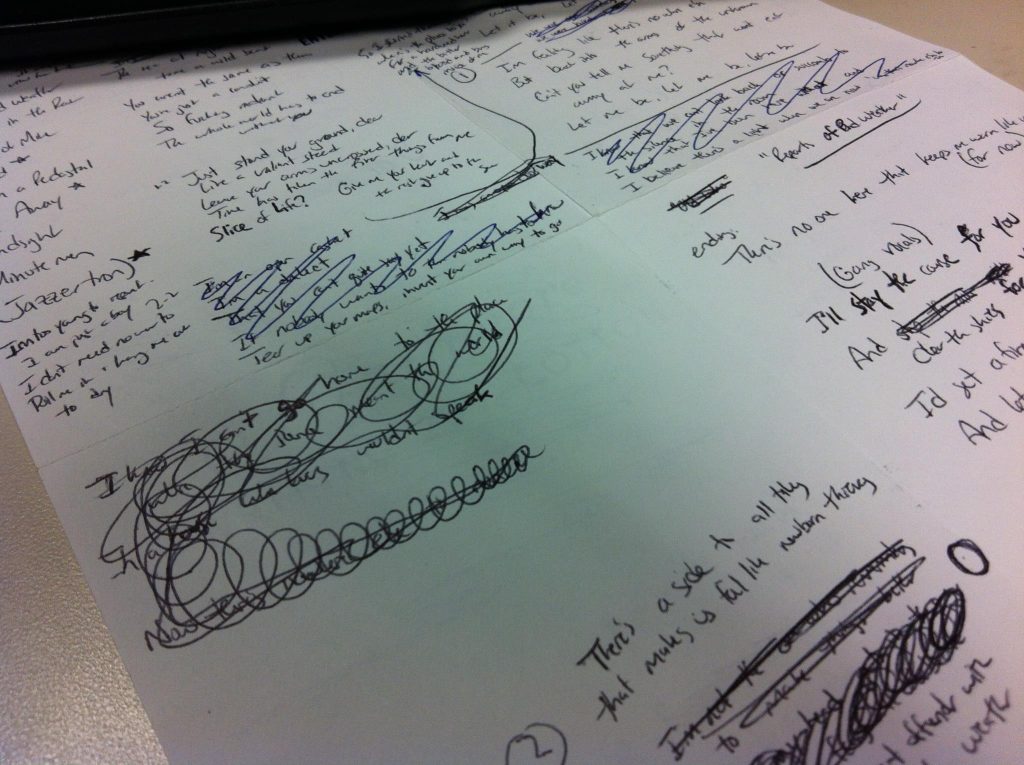
So, we started this Zoom call by talking about how after all these years, we’re suddenly talking about babies and what our kids are watching on Netflix. And now we’re talking about this song whose title, even a decade later, has not changed.
JC: My wife did not get it for the longest time. She’s like, “people are going to know you’re referencing the ‘c word’”. Then she saw that we spelled it ‘Seaward’.
RC: I totally forgot that’s where that generated from. As I’m arranging these songs, I’m thinking, “oh cool, nautical themes, blah blah blah…” but no – it was just the ‘c word’ reference from Arrested Development.
MINUTEMAN
If anyone is going to talk about this song, it’s gotta be Ryan.
RC: It’s… so angry. Haha. This is easily the most pissed off song we ever wrote. Right? I remember, when I first heard it back, I immediately said, “holy fuck!” It really tied back to what I was doing before The Cast Before the Break, which was heavier stuff.
JC: I don’t remember writing this one at all.
RC: We must have been in a bad mood that day or something. And then I got to a certain point where, I don’t get to play double bass a lot, so I figured I’d just do all of it. As much as possible.
I remember recording that part. You nailed that bridge on the first take. I’m pretty sure the take in the song is actually that first take. You hit the cymbal at the end of the part, jumped up from your stool and pumped your fist as silently as possible. You didn’t want to make any noise in the microphones. But you were so happy.
RC: It’s so fast. It’s really hard to fathom these things with a leg that doesn’t work right now. This song really takes you on a journey in five minutes that you definitely do not get anywhere else in our discography. But it fits so well. I think that’s one of the interesting things about it. The whole record has a certain vibe to it and this song feels like it should be out of place, but it fits just right.

It’s funny that we were just talking about cutting songs down – this was going to be the shortest song on the record and then it got extended almost twice as long with this improvised loop thing that I put together and glued on the end.
RC: It needed it. This was a fence song for me when it came to fitting into the structure of the album. And if it didn’t have that ending to kind of chill it out, I don’t know that it would have worked. It’s just a beautiful, haunting little melody, and feels so right for the song but also what it does for the album. It’s dead smack in the middle, it punches you in the mouth for like three minutes straight and then… we chill for a minute. It’s beautiful.
LE: When I hear the opening of this song, I picture Godzilla fighting Mechagodzilla, just destroying each other. Laser beams firing everywhere.
JC: One of my favorite things about it is that most of our songs tend to slowly build and eventually get to cool places. This one just comes right in out of nowhere with soaring riffs. It almost works in reverse to how we normally structure songs.
RC: That’s it! That’s what I remember wanting to do! I felt that about a lot of what we wrote. Back then, post-rock wasn’t my life and this song I thought, let’s do it in reverse and then slow that shit down. We don’t do that, we’ve never done that, and you don’t see that in this genre much.
JS: ‘Minuteman’ has my favorite bass moment on the record, and it’s just those two notes right before the bridge. It sets it up so well.
LE: One of my favorite things about ‘Minuteman’ is, for how heavy it is, it’s got so much groove to it. There’s kind of a nice swing to it and I remember vibing while everyone else is just like, hair on fire. I remember playing it live, grooving the whole time while you guys did your thing.
RC: That’s just what you do though! It doesn’t matter what you’re playing.
The special moments on this album are where we tried something we didn’t normally do…
SHY AWAY
This has always been one of my favorites. It’s very simple and doesn’t really go anywhere but in the best way possible. I will say, saxophone in a Cast Before the Break song wasn’t on my 2022 bingo card but I’m so happy it happened. What were you smoking when you came up with that idea, Jordan?
JS: I was watching Space Jam.
…Yeah? Haha. Honestly, I believe you 100%.
LE: I didn’t believe him at first, but he seems very serious.
JS: Very serious! I was watching Space Jam and I don’t know why, but it came into my head. I had been writing some guitar parts for that section and they just weren’t clicking. Out of nowhere, I thought saxophone could work instead. I had seen a video clip on Instagram of Eric [Sosler] just messing around and it gave me the idea to reach out. This song always kind of had a Bon Iver vibe to me, and I think the saxophone really cemented it in the end.
FROM A PEDESTAL
Lars, I know this is one of your favorites – I feel like you’ve always believed in this song. I was always on the fence about this one, I’m not sure why. Maybe it’s because it was one of the oldest ones and we played it a lot. What’s always stuck out to you about it?
LE: Man, I don’t know. I don’t know why I believed in it back then. I do know whenever we played it, it felt like Ryan and I were always very locked in. And seeing everyone else kind of dance around that felt good. Jordan, were you going to say something?
JS: Yeah, I always liked that this song builds and builds but then doesn’t end on this big epic thing. It always made me think of As Tall As Lions. Just the way that band was able to make epic songs that didn’t necessarily get huge all the time.
JC: It’s not that it sounds like it starts to fall apart, but you can tell it’s starting to run away from you a little bit. Because we always write songs that get to that point and then go crazy, I love that it feels like it’s getting there and then we just… take it away.
That ending… It was all very loose and improvised. Ryan, I think you did a few takes on your other drum set and then we pieced like a whole percussion section together.
RC: I remember doing a bunch of takes and going apeshit on things. But it wasn’t just me playing at the end there. I was playing one of the kits, and someone else was playing one of them. We did toms, rim clicks… I think it was all done at the same time to give it a live feel? I don’t know. It was forever ago.
SLICE OF LIFE
This is another song title I never thought we’d keep… Haha. I have a very distinct memory of writing this song, Ryan. It was you and I in Jeremy’s basement hashing out parts for all these songs, and you had this idea: “What if we wrote something that started with this slow, almost jazz-like drum beat and we just drone for a while?” It started out very improvisational. And for me, this song always stumped me. I had no idea what to do with it. At one point over the years, I cut it down to what it is now because I think it was like six or seven minutes long.
RC: I might get emotional talking about this song, not gonna lie. For the longest time, I believed the fuck out of this track. And it didn’t feel like the overall group felt the same way.
LE: I feel like I was that person for sure. I didn’t feel like it was going to come together. But now, the end product feels like that’s what it was at its inception. Which it was not. It feels way more complete now.
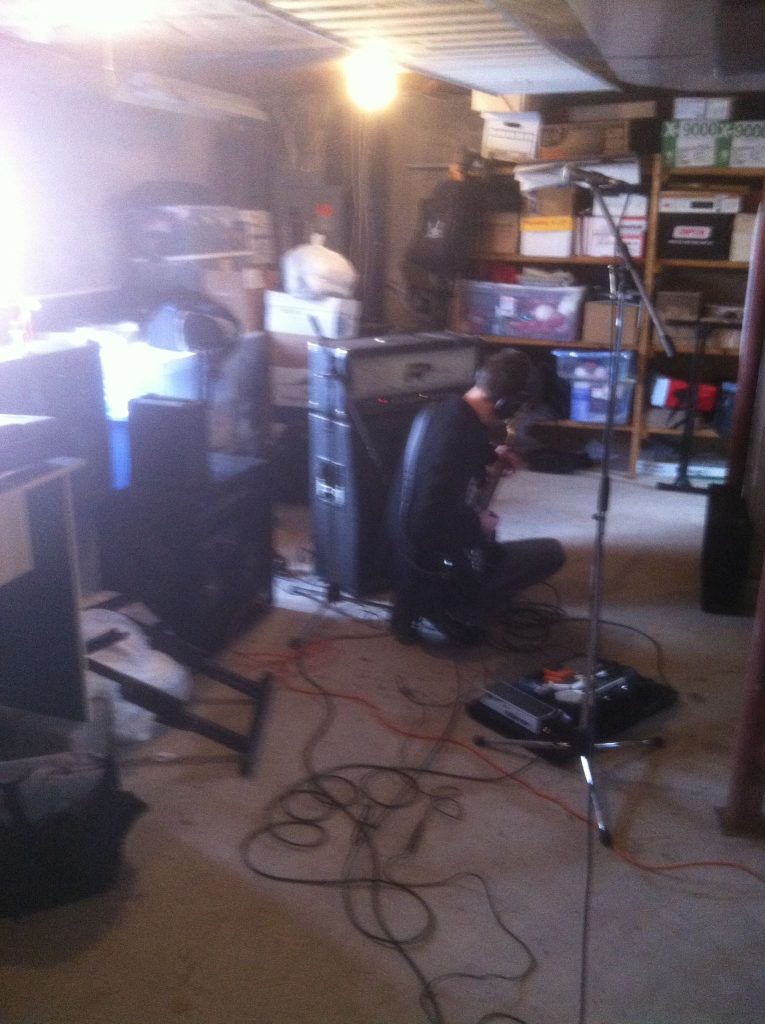
I still have the original session. This was definitely one where producing helped the shit out of it. I know you hate cutting songs down Ryan, but listening to the original version – it meanders, man. Focusing it took it to a whole new level. I hate relying on other people to validate what you do, but seeing it called out in a review as the standout track…
RC: Ha! Fuck you, guys… Ahh, there’s a child in here. What are you doing in here? You’re not supposed to be in here, I’m swearing!
That is totally going in the interview.
RC: To your point, it’s so much better with the cuts. It needed that, 100%. At that point in my musical career, I could not talk [guitars]. I couldn’t necessarily convey what I wanted to get out.
I remember that.
RC: But now I can. And the song does what I wanted it to do. The special moments on this album, for me, are where we tried something we didn’t normally do. This is definitely one of those moments. It’s a swingy, post-rock jam in four minutes.
It’s funny because it starts there, but it ends up at what is arguably the catchiest, most accessible ‘chorus’ on the record. The combination of those things shouldn’t work, but it did in the end. Jeremy, when we started revisiting this, we had no idea what to add to it part wise. This was the one where it was just you and I in the end, right?
JC: Yeah, for a few different reasons, we wound up finishing it. Same thing though, hearing your cut down version made it make sense to me. When I heard the original version where it was just four minutes of noise and crazy stuff, I did not get this song. I didn’t know where it was going. But when you sent me the cut down version that starts quiet and builds to the end, I got it. I spent a day or two sitting down and writing riffs to build until the ending. And I love how it came out.
I’ve played with you a long time and I’ve never heard you write parts like these before. That first lick you come in with – I fucking love it.
JC: I was playing in this work band, doing old classic rock songs and then played a bit in my father-in-law’s band that does all blues stuff. So, I had to learn so many classic rock solos and play technically in ways that I have never played before. After four months learning and drilling those songs, I had some new tools and techniques I thought I could tap into here.
RC: That’s hilarious – that intro lick is you, Jeremy?
JC: Yeah.
RC: That 100% would have been a Jordan lick to me.
JC: The clean lick was TJ, and he had the crazy stuff at the end, but everything else in there is me.
RC: That’s crazy. Jordan was always the one with the bends. I never would have thought that was you playing that lick. It’s great.
HINDSIGHT
I think it’s safe to say this song means a whole lot to all of us.
JS: Ryan mentioned the phrase exercising demons earlier – that’s how I feel about this song and how it came out. Here’s the thing: I don’t necessarily believe in haunted places. But if there was any place that I’ve felt had bad omens – it was that basement where this song started.
JC: You’re talking about the basement in the apartment TJ and I shared [in 2010]?
JS: Yeah. I don’t know. That was a crappy time in life, period. So ‘Hindsight’ always felt tied to that. But after all these years developing it, finishing it felt like exercising demons. And that’s why I felt it needed to end the album. It feels like catharsis. I’m so happy with how it came out in the end.





I’m pretty sure ‘Hindsight’ was the first song we wrote for this record. It’s fun that it comes back full circle to end it.
JC: I can write you an essay about this fucking song. It’s an awesome ending because I feel like the first half of the record is very different than the second. It progresses naturally, but the first half feels like that newer, ‘happier’ vibe. The second half starts to dive back into some older, darker stuff, but then ‘Hindsight’ comes and it’s a perfect blend of both. It starts dark but then everything switches to the major key [in the bridge], and it just ends on this glorious feeling. It’s a perfect summation of everything we had just gone through on the record. And having the song called ‘Hindsight’ – looking back and thinking we were never gonna get to this point? It gets me every time.
RC: It’s funny because now, I think it has a happy ending. But when we wrote it? To me, that was not a happy ending.
That’s fair.
LE: Yeah, to echo that, I remember this song not feeling very ‘positive’ when we were in the process. That feeling of being in that basement, writing it – I can put myself in that place, watching the pedals blinking. I remember it very vividly. But to Jordan’s point, it feels like a good relief in terms of where the songs are at now.
RC: It’s a great send-off to this long ass process. Just the fact that it’s happening – to hear these songs again and be reminded of a time when life wasn’t great… but it was good. I really enjoyed my time with these songs, and writing and recording all of this. The end of this song has a lot of emotional feelings from a closure standpoint for me. And now it’s done. We did it.
Where We Are Now is available today on all major streaming platforms. You can also purchase the record via Bandcamp.
